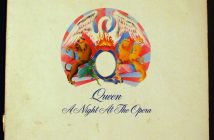David Bowie’s iconic album, Hunky Dory was released 45 years ago today on 17th December 1971.
For some, nothing in 2016 will come close to the tragedy that was the death of David Bowie. Polymath, jack-of-all-trades, artisan and master of his craft, Bowie was a musician and showman in ways that most singer/songwriters can only dream of being. And while the man may have passed on, his artistry will live forever. Hunky Dory serves as a perfect example of this.
Hunky Dory is probably best known for the iconic track, ‘Life on Mars?’, which was described once as “a cross between a Broadway musical and a Salvador Dalí painting” and is arguably Bowie’s best song, but in truth there is so much more to the singer’s fourth studio album. Written in celebration of the birth of his son Duncan Jones (yes, the same Duncan Jones behind Moon, Source Code and Warcraft), Hunky Dory is an intricate and perfectly-realised collection of songs about youth, rebellion and fatherhood. Containing Bowie’s signature sense of surreality and spanning multiple genres, the album contains some of his best and most varied work, from folk with tracks like ‘Kooks’ and ‘Oh! You Pretty Things’ to glam rock with ‘Changes’ and ‘Queen Bitch’.
Although Bowie’s fourth offering did not manage to hit no. 1 in the UK charts (it peaked at no. 3), and with ‘Life on Mars’ also only reaching that level, the album achieved Platinum status on 25th January 1982. Hunky Dory was also incredibly well received by the critics, with Spin, Rolling Stone and All Music all giving the album the maximum 5 stars. The album received further acclaim in 2010 when Time selected it as part of their ‘100 Best Albums of All Time’.
Considering that Bowie’s next album was The Rise and Fall of Ziggy Stardust, the fact that Hunky Dory is still remembered with the same level of admiration is testament to Bowie’s consistent quality. That even in the face of some of the tracks on Ziggy Stardust, there’s material on each of his albums to rival those and then some. Or, as Bowie would (and indeed did) say: “make way for the homo superior!”
Listen to the album below:
https://www.youtube.com/watch?v=Hm7DCVURAbw




